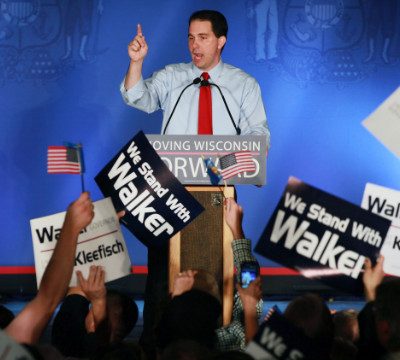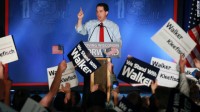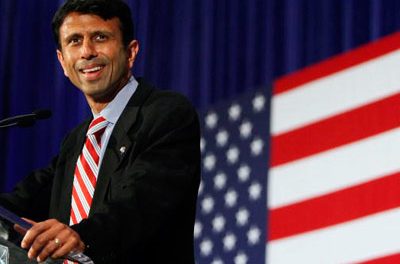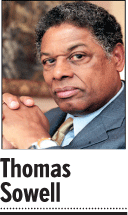By John Helton and Tom Cohen – CNN
This Republican Victory Likely to Help Mitt Romney Become Next U.S. President
In a vote that could have implications on both the November presidential race and for organized labor, Wisconsin Gov. Scott Walker on Tuesday successfully overcame a recall vote that would have removed him from office.
With almost all of the votes in, Walker, a Republican hero for pushing austerity measures that stripped collective bargaining rights from most public unions, led Milwaukee Mayor Tom Barrett by a 53-46 margin.
Tuesday’s vote was the culmination of a 15-month near-civil war that pitted unions and Democratic supporters against fiscal conservatives and Republicans after Walker signed a bill in March 2011 passed by the Republican-controlled legislature that took collective bargaining rights away from public employee unions in a effort to close the state’s budget gap.
Tens of thousands of demonstrators opposing Walker crowded the grounds around the state capitol and hung banners of protest in its rotunda after Walker signed the bill and kicked off a recall drive that gathered 900,000 signatures — nearly 400,000 more than required.
During a bitter fight over the law last year, Democratic legislators left the capital to prevent a quorum.
In declaring victory on Tuesday, Walker said the outcome validated his hard line on cost-cutting.
“Tonight, we tell Wisconsin, we tell our country and we tell people all across the globe that voters really do want leaders who stand up and make the tough decisions,” he told a roaring crowd at his campaign headquarters in Waukesha.
He also addressed the polarized climate in the normally centrist state — his crowd jeered when he mentioned that he had a phone conversation with Barrett before taking the stage.
“Bringing our state together will take some time — there’s just no doubt about it,” he said.
But he offered a first step by inviting members of the legislature over for bratwursts and burgers, “and then maybe a little bit of good Wisconsin beer, as well.”
In conceding, Barrett also drew catcalls when he mentioned the call with Walker. And he said it was important that he and the governor work together.
But he urged his supporters to fight on’
“This is not an end,” he said. “Tonight ends another chapter in Wisconsin history but there’s more to come.”
Unions pointed to Walker supporters’ outspending his opponents by a more than 7-1 margin, 70% of it from outside the state.
“Adding to this gargantuan challenge of recalling only the third governor in American history was the flood of secret corporate cash distorting our democracy — a dangerous example of a post-Citizens United America,” AFL-CIO president Richard Trumka said in a statement after the vote, referring to the Supreme Court decision that allowed unlimited political contributions from corporations and unions.
Both parties cast the debate as a larger referendum on the role of government and policies supported by both parties.
While political pundits framed the race as a test run for the presidential election, fiscal conservatives were looking for momentum in a growing movement to curb what they see as public employee unions getting larded with benefits from politicians that they helped elect.
“(Walker’s) one of the Republican governors who has been out on the point on this issue about whether there are excesses in public employee unions in terms of their pension plans or health care plans and so forth,” CNN political analyst David Gergen said. “This is a very, very hot issue from New York to California and from New Jersey to Indiana to Ohio to Wisconsin.
“And this election tonight was well-regarded long before by both sides as the second most important election of the year. And here Scott Walker, I must say, to a surprise, given a year ago, it looked like he was going to lose this, tonight, to win is a substantial defeat for labor, for public employee unions, and a substantial defeat — a substantial victory for those who have been trying to curb them.”
Gergen: A victory for curbs on public worker unions
Public opinion polls leading up to the vote had shown Walker holding a narrowing lead and early exit polls suggested the race would be tight, with 34% of those responding identifying themselves as Democrats, 35% saying they’re Republicans and 31% saying they’re independents.
A state official said on condition of not being identified that turnout appeared to be strong, with reports of some polling places running out of forms for same-day voter registration.
The race was a rematch of the 2010 governor’s contest, won by Walker with only 52% of the vote.
Recalling a governor is rare — trying to, not so much
But this time, the stakes were higher.
The first-term governor’s win could give Republicans a major boost in efforts to make Wisconsin a battleground state in the November presidential election. It now has a strong ground operation in a state that has been remained blue since 1988.
But exit polls indicate that the vote Tuesday wasn’t the presidential litmus test that many pundits suggested.
While Barrett went down to defeat, those responding to exit polls favored President Barack Obama over GOP presumptive presidential nominee Mitt Romney by a 51-44 margin. And Obama got higher marks than Romney on handling the economy by a slim margin and on helping the middle class by a wider margin.
Obama easily won the state in 2008, but Walker’s unyielding commitment to fiscal austerity in the face of chaotic protests last year made him the poster child for tea party conservatism.
Walker would have been only the third governor in U.S. history ousted by a recall election.
Along with the gubernatorial recall, Lt. Gov. Rebecca Kleefisch also won her recall election.
Four Republican senators also faced recall votes Tuesday but results were not yet available. A loss of any of those four races would have tipped control of the Senate to Democrats, but with the legislature out of session until after the general election, a Democratic win would have provided mostly a moral victory.
A former Republican state senator ousted in a Wisconsin recall vote last year said Tuesday that the political wound he suffered was worth it because of the fiscal austerity achieved.
“I lost my job standing for something, and I was standing for the people, fiscal responsibility and the future of this country and the state and its residents,” Dan Kapanke said, adding that “the times dictate tough decisions, and we want our elected officials to do the right thing and worry about the future and not just about the next election.”
Walker complains that repeated recall efforts over past years are stalling progress and costing the state needed money.
Earlier Tuesday, Barrett said he agrees that voters are tired of recall politics, but he blamed Walker for creating a divisive political environment that inspired the effort to oust him.
“What Gov. Walker doesn’t say is he was the one who, these are his words, dropped the bomb and attempted to divide and conquer. So he set out on a strategy to divide this state. He succeeded in dividing the state,” Barrett said, adding that the proper course now is to “get rid of the instigator rather than to allow him to continue because I think this state will remain this bitterly divided if he continues in office.”
About $64 million has been spent on the race since November, an analysis from the Center for Public Integrity found. That’s a state record, shattering the record of $37.4 million spent during the 2010 governor’s race.
Wisconsin’s deep political anger isn’t going away
Walker collected $30.5 million to Barrett’s $4 million. Roughly two-thirds of Walker’s contributions came from out of state, the Center for Public Integrity reported, while only a quarter of Barrett’s funds originated from outside Wisconsin.
Barrett said Tuesday that such outside influence is a change for Wisconsin.
“What’s happened is, Scott Walker has become the rock star of the far right and has been able to raise literally millions of dollars from out-of-state contributors,” Barrett said.
Dollars roll in from beyond Wisconsin for recall
During a bitter fight over the law last year, Democratic legislators left the capital to prevent a quorum, and tens of thousands of protesters converged on the State Capitol building in what became an occupation.
After the law was signed, Democrats immediately began a recall effort that led to Tuesday’s vote.
Walker has defended his budget actions as necessary for the fiscal health of his state and described his campaign as one of a strong leader who is making the necessary “tough decisions.”
The campaign has been fierce, with campaigners complaining of keyed cars, verbal harassment and a general lack of tolerance for differing opinions.
“We have an example of Hatfields and McCoys going on in this state like we have never seen,” said Brian Nemoir, a Milwaukee-based Republican strategist. “People are hyper-engaged, as much in support for their own candidate as in disgust for the opponent.”
Handmade signs were nearly as prevalent as official ones. Some locals say they have resorted to lowering their voices in public when discussing the recall to avoid setting off arguments with strangers.
The Justice Department on Monday dispatched federal observers to monitor Milwaukee polling places Tuesday to ensure that no voter discrimination took place.
A litany of Republican stars have campaigned for Walker, including fellow governors Chris Christie of New Jersey, Nikki Haley of South Carolina, Bobby Jindal of Louisiana and Bob McDonnell of Virginia, as well as U.S. Sen. Marco Rubio from Florida.
While Romney didn’t campaign for Walker in Wisconsin, he quickly congratulated the governor after his victory.
“Governor Walker has demonstrated over the past year what sound fiscal policies can do to turn an economy around, and I believe that in November voters across the country will demonstrate that they want the same in Washington, D.C.,” Romney said in a statement.
Americans for Prosperity, a conservative advocacy group built around many of the same principles as the tea party, has pumped more than $10 million into Wisconsin backing Walker’s policies.
Barrett, meanwhile, got his own high-powered support from former President Clinton, as well as Democratic National Committee Chairwoman Debbie Wasserman Schultz and Maryland Gov. Martin O’Malley.
However, his campaign fund-raising has badly trailed the support Walker received. The Progressive Change Campaign Committee announced Saturday that it was spending $100,000 in the five days before the Wisconsin recall vote, bringing its investment to $300,000.
Obama never came to Wisconsin to campaign for Barrett, which Republicans surmised was because the president believes Barrett will lose.
On Sunday, Barrett said on CNN’s “State of the Union” that his campaign never asked Obama to appear on his behalf, adding that “we understand he’s got a lot going on.”
White House Press Secretary Jay Carney acknowledged the uniqueness of the contest while stressing there’s no doubt where the president stood.
“The president’s made clear all along his opposition to those who would take away workers rights — to actions that would take away or diminish worker’s rights,” Carney said. “And he’s also made clear his support for Tom Barrett.”
Four Republican senators also faced recall votes Tuesday but results were not yet available. A loss of any of those four races would have tipped control of the Senate to Democrats, but with the legislature out of session until after the general election, a Democratic win would have provided mostly a moral victory.
CNN’s Peter Hamby, Dana Bash and Greg Botelho contributed to this report.
View video of victory speech of Wisconsin Gov. Scott Walker








